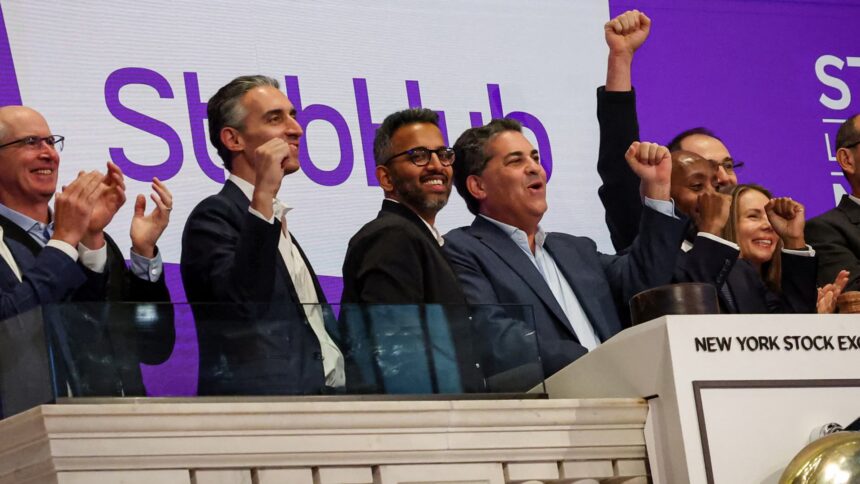Eric Baker, co-founder and CEO of StubHub, rang the opening bell at the New York Stock Exchange as the company made its long-awaited debut on September 17, 2025. StubHub, the well-known ticket-reselling platform, opened its trading at $25.35 per share, after pricing its initial public offering (IPO) at $23.50—a move that successfully raised $800 million in capital for the company. The shares are now listed under the ticker symbol “STUB.”
This IPO marks a significant moment for StubHub, especially after the company had to pause its plans earlier in April due to market turmoil triggered by President Donald Trump’s “Liberation Day” tariffs. This was the second delay for the company, which also shelved its IPO plans in July 2024 amid market volatility.
The market’s current climate is favorable, with a recent resurgence of technology offerings. StubHub’s IPO follows notable debuts from companies like Klarna, a Swedish buy now, pay later firm, and Gemini, the cryptocurrency exchange founded by Cameron and Tyler Winklevoss. Other companies that have recently gone public include cryptocurrency exchange Bullish, design software company Figma, and stablecoin issuer Circle.
StubHub’s journey over the past 25 years has seen significant transformation. Initially acquired by eBay for $310 million in 2007, the company was reacquired by Baker in 2020 through his new venture, Viagogo, for approximately $4 billion.
As the live events market resurged following the Covid pandemic, StubHub experienced a boom in sales attributed to massive events like Taylor Swift’s Eras Tour and Beyoncé’s Renaissance Tour, as well as major sporting events like the Super Bowl. However, the company disclosed in its updated prospectus that revenue from these popular events can make its earnings appear unpredictable, often leading to fluctuations.
In their most recent quarterly report, StubHub experienced a revenue increase of 10% from the previous year, totaling $397.6 million. However, the company’s net loss widened to $35.9 million, up from $29.7 million in the same period last year. The gross merchandise sales, which represent the total payments made by ticket buyers, reached $2.08 billion for the quarter ending March 31.
StubHub’s primary business model involves connecting buyers with ticket resellers. Last year, over 40 million tickets were sold on the platform, sourced from approximately one million sellers. StubHub faces competition from other ticket platforms, including Vivid Seats, which went public via a special purpose acquisition company in 2021, SeatGeek, and Live Nation Entertainment, the parent company of Ticketmaster.
In light of ongoing investigations, the Federal Trade Commission (FTC) is examining Ticketmaster’s efforts to prevent automated bots from bypassing per-person ticket limits on sought-after events. Additionally, the FTC had previously issued a warning letter to StubHub regarding compliance with its “junk fees” rule, after claiming that some listings on the platform did not adequately display total ticket prices, including mandatory fees and charges.
Madrone Partners stands as StubHub’s largest investor, holding 24.5% of Class A shares before the public offering. Other notable investors include WestCap with 12.3% and Bessemer Venture Partners with 8.8%.







